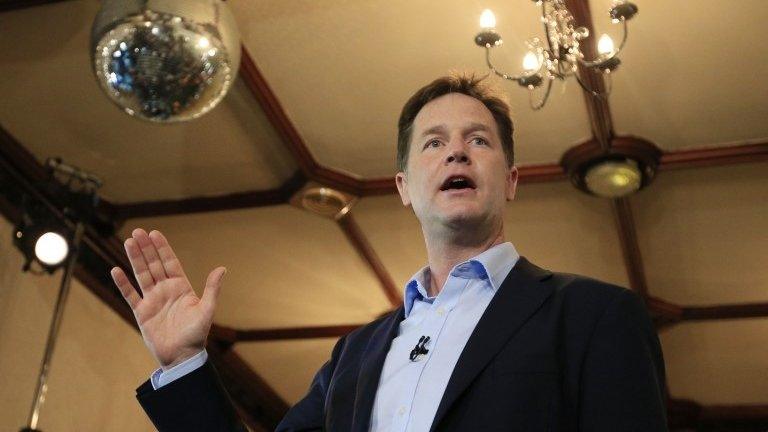Election 2015: Don't gamble on the SNP, Ed Miliband says
- Published
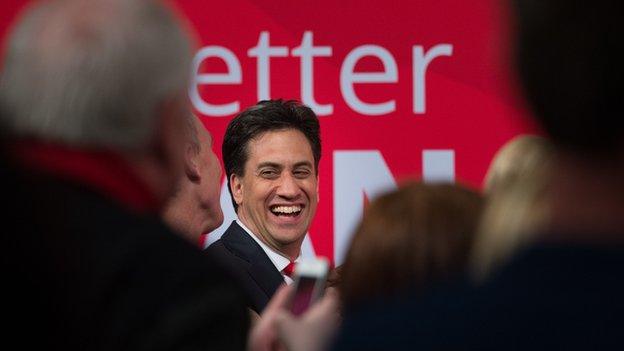
Ed Miliband has urged voters not to "gamble" with the SNP, saying his opposition to the nationalist party was "principled" not "tactical".
At a Glasgow rally, Mr Miliband said there would be "no deal, no coalition, no pact" with Nicola Sturgeon's party.
Prime Minister David Cameron said the threat of a Labour/SNP government "remains the same".
Ms Sturgeon said a minority Labour government would be "paralysed" if it refused to talk to other parties.
Meanwhile, UKIP's Nigel Farage said he could support a deal with a Conservative and Lib Dem coalition.
In other election news:
Ed Miliband said it was "brutally clear" David Cameron would cut child benefit if the Conservatives are in power
Mr Cameron promised his party would close the "growth gap" between the south and north of England
Nick Clegg said £8bn for the NHS was his latest "red line" in the event of coalition negotiations
Labour parliamentary candidate Richard Garvie was suspended after being convicted of fraud
UKIP suspended one of its candidates over a slur sent to a Jewish Labour candidate from his Twitter account
The parties clashed over potential post-election arrangements after Thursday's BBC Question Time, in which Mr Miliband said there would be no Labour government if it involved "deals or coalitions" with the SNP.
Polls suggest a hung Parliament is likely after 7 May, and that the SNP could take a number of Labour seats.

Analysis by Labour campaign correspondent Iain Watson
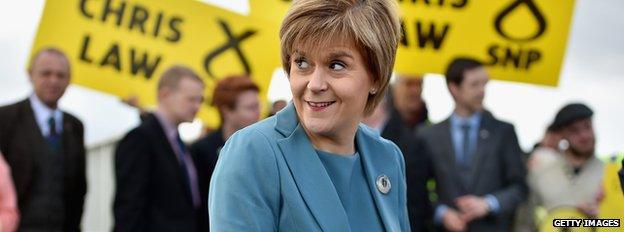
Ed Miliband has been clear for some time he wouldn't be offering the prospect of a coalition to the SNP.
Privately then publicly he stated his approach if he is in a position to form a minority government: He would put forward a Queen's Speech - a legislative programme - without an SNP deal and dare the nationalists to vote it down.
He thinks he is in a strong position because Nicola Sturgeon has said she wouldn't give David Cameron the keys to Downing Street.
But by going even further and saying he would rather not be in government than do a deal with the SNP, he has given Nicola Sturgeon a powerful weapon in her so far successful battle to persuade former Labour voters in Scotland to back her party because - as at the referendum - she can argue that Mr Miliband is too close to the Tories.
So why do it? Well the polls suggest that Scotland has turned from fertile to hostile territory for Labour so he has in effect given up on the prospect of very many former voters returning to the fold.
But in 50 key English marginals, polling for ComRes suggests - after a relentless focus on this by the Conservatives - three out of five voters are worried about the influence the SNP would have over a minority government.
So he decided to try to eliminate this negative rather than pursue an all but lost cause.

Mr Miliband returned to the theme in Glasgow as he addressed Labour supporters having been greeted by some protesters as he arrived to make his speech.
"Nationalist never built a single school... never lifted a single person out of poverty," he said.
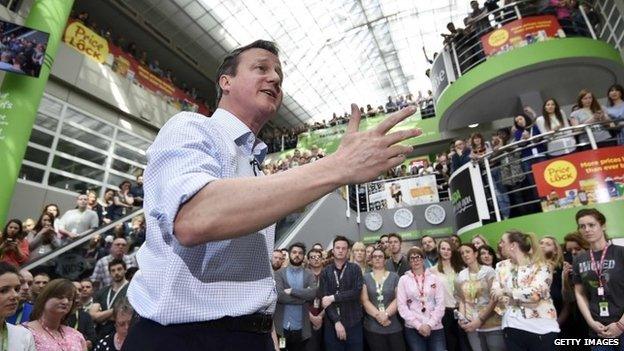
David Cameron said Mr Miliband's comments on the SNP "change nothing"
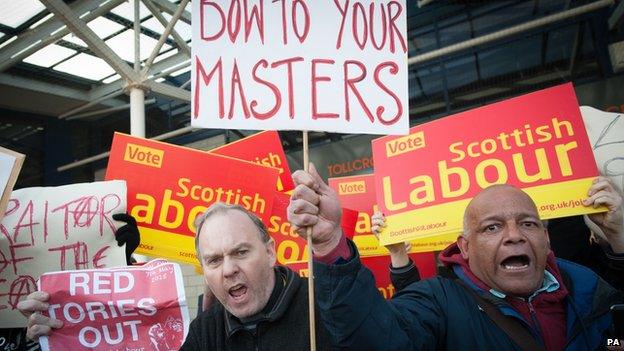
There were protesters and Labour supporters waiting for Ed Miliband in Glasgow
He praised former Labour leaders John Smith and Gordon Brown and said the SNP could not "lecture" his party about fighting the Conservatives.
Mr Miliband also renewed his attack on the Conservatives over welfare cuts, saying there were "six days to save your child benefit" after Mr Cameron faced questions about his party's plans on Question Time.
The prime minister, who said child benefit was "vital" to parents, dismissed Mr Miliband's ruling out of an SNP deal.
He said: "What Ed Miliband said last night actually changes nothing.
"Is he really saying that if Labour don't get a majority but if Labour plus the SNP is a majority 'I won't be PM'? Of course he's not saying that.
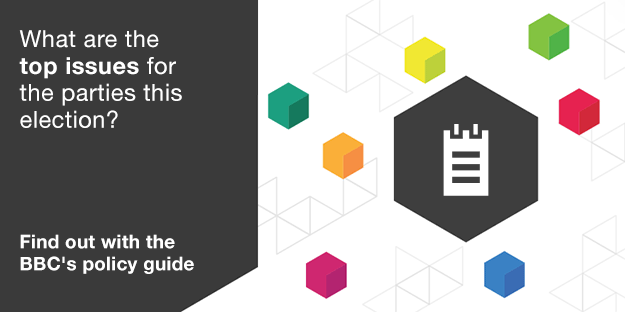
"The threat today is the same as the threat yesterday. Ed Miliband propped up by the SNP not governing on behalf of the whole country."
SNP leader Nicola Sturgeon said people would be appalled by Mr Miliband's refusal to consider a deal with her party, and she said his comments would only galvanise more people to vote for the SNP so Scotland had a decisive voice at Westminster.
She told the BBC her party could vote against a minority Labour budget without bringing the government down if it was not consulted.
Mr Miliband "wants to cling to the pretence that he's going to win a majority," she said.
"The polls say he's not. And if he ends up in the position of being in a minority government then he simply cannot continue to say he's not going to talk to anybody, because that means his own government would be paralysed. And he will not want that to happen."
The Conservatives highlighted a comment from Labour's shadow health secretary Andy Burnham, who said "of course" when asked whether there would be dialogue with the SNP if a minority Labour administration needed to get its policies through the House of Commons.
Labour's Hilary Benn also told the BBC's Daily Politics his party would have to have discussions with the SNP to get a Queen's Speech through parliament, saying such conversations were "the normal to and fro of the House of Commons".
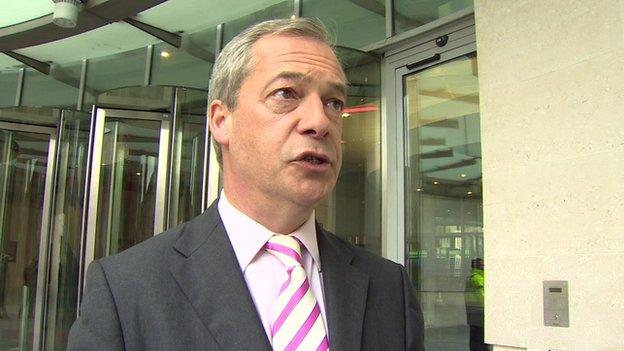
Mr Farage declined to name any specific "red lines" for his party in the event of a future deal
Earlier, on BBC Radio 4's Today programme, UKIP leader Nigel Farage said he didn't want UKIP to go into coalition.
However, he said he could do a "confidence and supply" deal with a Conservative and Liberal Democrat coalition.
In such a deal, a minor party would typically support a bigger party in any votes of no confidence which could threaten to topple the government, and in voting through the Budget.
Green Party leader Natalie Bennett said Mr Miliband's comments were "very surprising", saying "he appeared to say that he'd leave David Cameron in place, rather than be prepared to work with the SNP".
Liberal Democrat leader Nick Clegg said Mr Miliband had been "foolish" to say he would implement his manifesto in full, even if he does not win a majority.
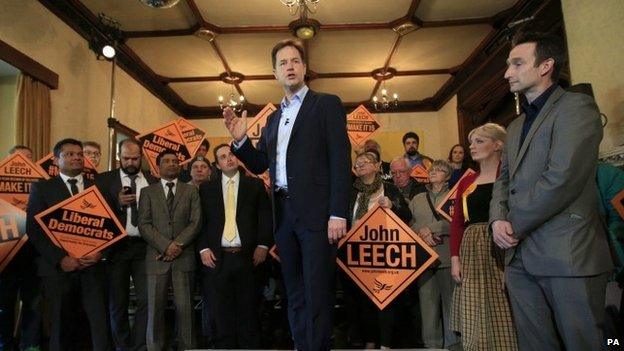
Mr Clegg said the NHS was a "red line" for his party
"It's just another ludicrous claim from Ed Miliband. It's just such a foolish thing to say," he said.
"If you don't win a majority and you have to govern with another party, you don't have the democratic right from the British people to insist on implementing your manifesto in full without any compromises."
Mr Clegg made the comments on a visit to Manchester to set out another of his party's "red lines" before entering into any future coalition.
He said the Lib Dems would insist on securing £8bn funding for the NHS, and making sure mental health issues were treated with the "same esteem" as physical health before entering into any deal with another party.
* Subscribe to the BBC Election 2015 newsletter to get a round-up of the day's campaign news sent to your inbox every weekday afternoon.


The best of BBC News' Election 2015 specials
- Published30 April 2015
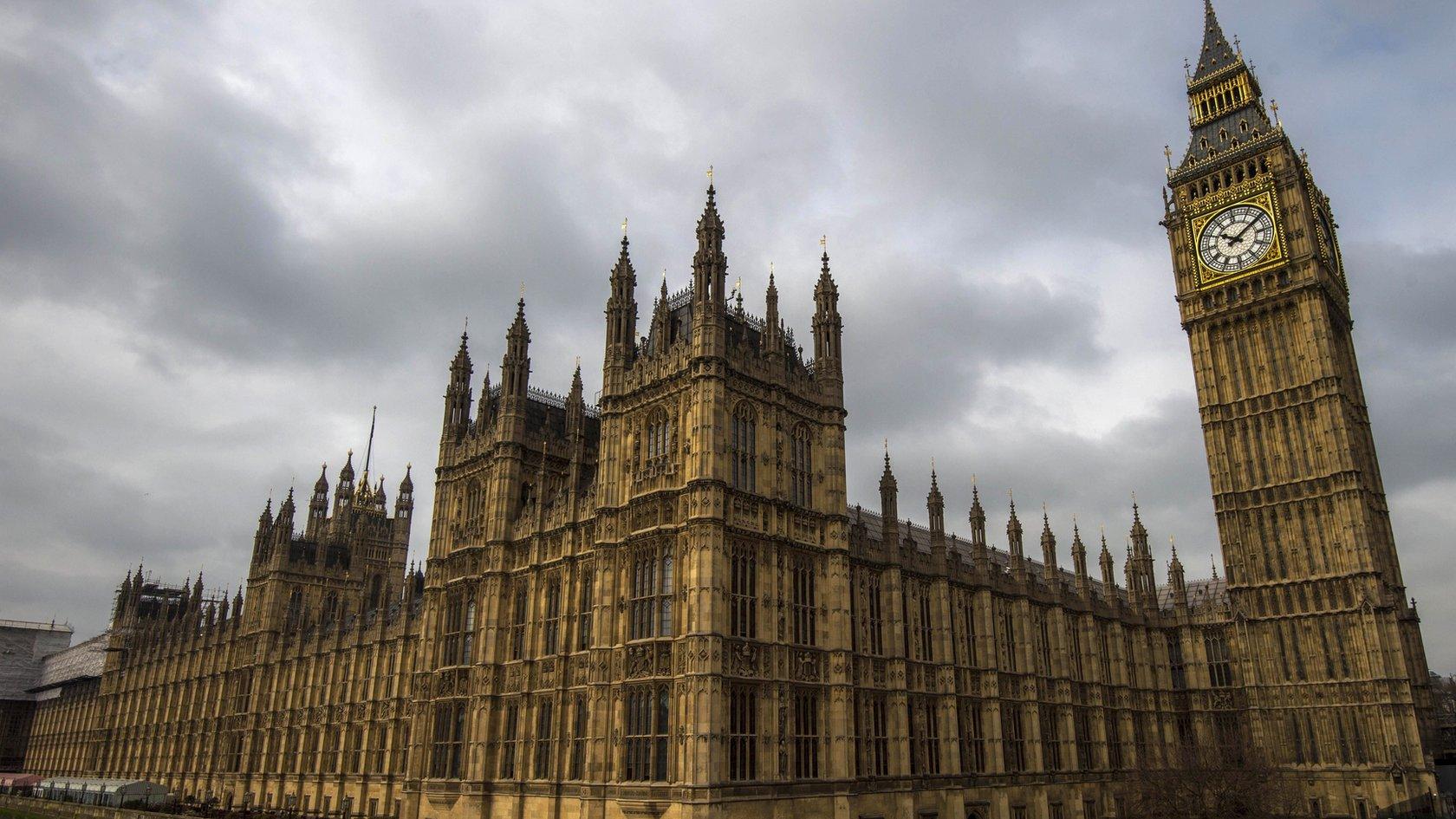
- Published4 May 2015
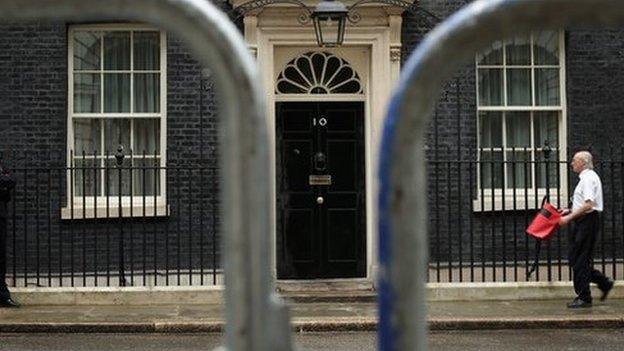
- Published1 May 2015
